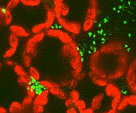Plant Pathology, Department of

Department of Plant Pathology: Faculty Publications
Document Type
Article
Date of this Version
8-1-2022
Citation
Research paper. JOURNAL OF NEMATOLOGY. e2023-1 | Vol. 55. DOI: 10.2478/jofnem-2023-0006
Abstract
Nematodes are the most abundant and diverse animals on the planet but lack representation in biodiversity research. This presents a problem for studying nematode diversity, particularly when molecular tools (i.e., barcoding and metabarcoding) rely on well-populated and curated reference databases, which are absent for nematodes. To improve molecular identification and the assessment of nematode diversity, we created and curated an 18S rRNA database specific to nematodes (18S-NemaBase) using sequences sourced from the most recent publicly available 18S rRNA SILVA v138 database. As part of the curation process, taxonomic strings were standardized to contain a fixed number of taxonomic ranks relevant to nematology and updated for the most recent accepted nematode classifications. In addition, apparent erroneous sequences were removed. To test the efficacy and accuracy of 18S-NemaBase, we compared it to an older but also curated SILVA v111 and the newest SILVA v138 by assigning taxonomies and analyzing the diversity of a nematode dataset from the Western Nebraska Sandhills. We showed that 18S-NemaBase provided more accurate taxonomic assignments and diversity assessments than either version of SILVA, with a much easier workflow and no need for manual corrections. Additionally, observed diversity further improved when 18S-NemaBase was supplemented with reference sequences from nematodes present in the study site. Although the 18S-NemaBase is a step in the right direction, a concerted effort to increase the number of high-quality, accessible, full-length nematode reference sequences is more important now than ever.


Comments
Open access.